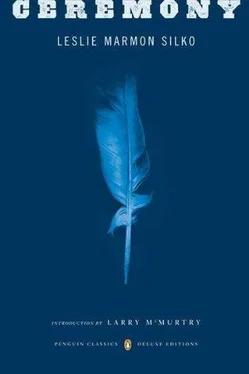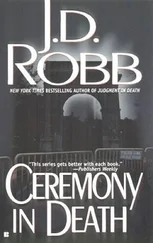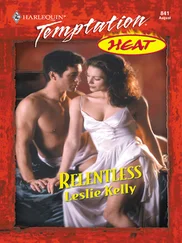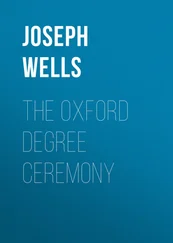The Mexican cattle settled down and moved more slowly, but they still had little regard for fences. They watered and grazed at the Cañoncito windmill for a few days before they started traveling again. It was simple to keep track of them because they were always moving south. By the end of May they were all the way to the flats by Fernando’s place; but they still ran if the men on horseback tried to get close; and if they were pushed into a corner where fences intersected, they lunged through the wire without hesitation and trotted away to a safe distance, where they stood in a semicircle to watch the horsemen.
They had not bothered to brand the cattle because they had a bill of sale which acknowledged their Mexican brands. But when they saw how the cattle kept moving, Josiah got worried and decided to brand them in case they got off reservation land. So in the middle of June, Tayo and Rocky and Robert went to help Josiah with his cows. It took almost the entire day to round them up because they were so wild. As Robert said, it was okay as long as they were in flat open country with only a few places to water; they could be found then. But he would hate to see them get up into the hills in the thick junipers and piñons where they could hide. “You’ll never get them then, except with a thirty-thirty,” Robert said, and Josiah nodded. There were three calves born when they corralled them, and two of the cows looked as if they would calve within a few days. The little calves reminded Tayo of new shoes, bright white with light brown speckles, silky and untouched by mud and sand. It was difficult to see how these calves would grow according to Josiah’s theories. They were the same color as their mothers and they had the same wild eyes. But Robert had to admit that the calves were stocky through the shoulder and hip, showing at least some trace of the fine registered Hereford bull that Ulibarri had insisted and sworn was their sire. They still ran like antelope in the big corral, bawling to escape the men with ropes. But Josiah said they would grow up heavy and covered with meat like Herefords, but tough too, like the Mexican cows, able to withstand hard winters and many dry years. That was his plan.
It was a good day when they branded them. Big fluffy clouds that were high on the west horizon in the morning were dark blue and low by the afternoon, and a sudden rain shower came and washed down the dust of the corral and the sweat from the work. The cows already had big Mexican brands on their sides, extending across their ribs, a brand so big you could see it for a half mile, Josiah said. And Robert nodded, and added, “That’s about as close as you can get to them anyway.” The brand wasn’t like American brands, which were initials or letters or even numbers; it looked like a big butterfly with its wings outstretched, or two loops of rope tied together in the center. They added Auntie’s brand, a rafter 4, on the left shoulder of the cows and calves, and let them go. They galloped away, kicking up red clay dust; they were still going south.
Josiah went to see her the day after the cattle were delivered. He talked to Tayo in a low confidential tone and told him not to let Auntie or old Grandma find out. They were outside at the woodpile, each with an arm full of kindling, but he whispered to Tayo as if Auntie were only a few feet away from them. He straightened up and glanced over Tayo’s head at the sun, which was almost down, and spoke in a more natural tone. “Anyway,” he said casually, “I’m only going up there to thank her again for letting me in on a good deal.” He changed his shirt and put on a stiff new pair of Levis and wiped off his fifty dollar boots with the towel that was still damp from drying his arms and face. He told Tayo to get the sharp scissors out of Auntie’s sewing basket, and he trimmed the hairs in his thin mustache. Tayo followed him outside into the cool dim evening. Josiah looked at his own reflection in the truck window, stroking the hairs of his mustache into place. He made Tayo promise to tell Auntie and Grandma that he had gone to Paguate on business. Tayo nodded, but he figured they already knew where Josiah was going anyway.
She was sitting in the shade on her wicker chair; her eyes were closed and her face was relaxed. He liked to look at the way her light brown skin had wrinkled at the corners of her eyes and her mouth, from too much laughing she liked to say. She knew he was standing there because the stairs up to the second floor porch were loose and squeaked. “Sit down,” she said, without opening her eyes, “enjoy the springtime with me.” He liked the way she talked. There was something in her eyes too. He saw it the first time when she had said, “I’ve seen you before many times, and I always remembered you.” Josiah could not remember ever seeing her before, but there was something in her hazel brown eyes that made him believe her. He sat on the straight-back chair beside her and looked over at the big cottonwood that grew next to the porch, its branches sweeping and wide, hiding a portion of the northeast sky.
On the fourth day something buzzed around inside the jar.
They lifted the buckskin and a big green fly with yellow feelers on his head flew out of the jar.
“Fly will go with me,” Hummingbird said. “We’ll go see what she wants.”
They flew to the fourth world below. Down there was another kind of daylight everything was blooming and growing everything was so beautiful.
The hot weather and the fact that Lalo had always bootlegged beer to the Lagunas and Acomas brought him there one day when she was sitting in the shade of the porch outside the bar. She spoke first, asking if he had a cigarette paper. Josiah was surprised that a Mexican woman had spoken to him, and he gave her the paper without looking at her face. He stared at the sack of Bull Durham in her lap and watched the way she rolled the cigarette without spilling any tobacco. He was suddenly aware that she was watching him, and he mumbled something about it being a hot day, and then left with his paper sack full of cold beer. But the rest of the afternoon, and that night too, he had an uncomfortable feeling that he had forgotten or lost something at Lalo’s. After supper he went out to make sure his work gloves were on the seat of the truck. He reached into his pocket and counted the money to make sure Lalo had given him the right change. He didn’t sleep well that night either, and even while he dreamed he was still aware of this feeling, that something had been left behind. So the next day he went back to Cubero. It wasn’t until he drove past the Cubero store and found himself looking to see if she was sitting on the porch that he realized his heart was beating like a boy’s, and it was too late. He knew then what it was he had left behind.
She looked up and smiled as if she had been waiting for him. She got up from her chair as he came up the steps and gestured at the bright sun and cloudless sky. “It’s too hot down here,” she said, walking to the stairs at the end of the long porch. He didn’t say anything; he just followed her up the spiral stairs.
“Some things I don’t remember too well,” she said, “names of the places, names of the people, or even their faces. These small towns like El Paso and Socorro were full of people passing through the way I was. I danced. That was all that was important.”
She got up from the bed and disappeared through the curtains across the doorway. Josiah heard her cranking the Victrola; the needle scratched over the flamenco music. She brought out the shoes from a trunk under the bed. They had been wrapped carefully in white tissue paper: shiny black leather with high square heels. She hitched the blue silk dress higher on her wide hips and held the edges of the fabric in both hands as she arched her back and tossed her head. At first, all he was aware of were the heels of the shoes beating rapidly against the floor, and he wondered if Lalo and the afternoon customers in the bar downstairs could hear it. But as the music gathered speed, he forgot about how she made the room shake, because the spinning and tossing of her body and the momentum of the music had gathered him close, and he found himself breathing hard and sweating when the Victrola finally ran down.
Читать дальше












